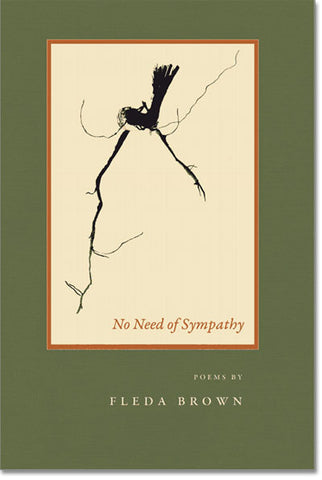
About This Title
Any one poem in Fleda Brown’s eighth collection may touch on contemporary science, physics, family, politics, the nature of poetry, and the nature of reality. There are sonnets for all ten grandchildren written by a grandmother, poems about the Big Bang, child labor, the moon over Paris, and tent caterpillars, all written with humility, humor, curiosity, and a deep love of life.
“Worms”
Worms can replace parts.
They can restart themselves
if they’re cute apart. And
the slime they leave behind
glues the earth together.
They have no eyes.
Imagine scrunching alone
through life, armless,
legless, and blind
yet so convinced
of your usefulness that it
makes some kind of sense.
Praise for No Need of Sympathy
“Fleda Brown is a poet of transformation and attention. One reads her poems and finds oneself changed by the trajectory, the engagement... it is the magical navigation from one observation, one glimpse or inkling, to an explosion of understanding and impression that is and deserves to be Fleda Brown’s unique claim.”—Laura Kasischke
“If you agree with me that a poem can be as bountiful as a rich Victorian narrative, and as wise... then you’ll want to join me here in the ‘Wow, I Like No Need of Sympathy Club.’ Your membership fee is the same as your membership privileges: this book.”—Albert Goldbarth
About the Author
Fleda Brown is the author of Driving With Dvorák (University of Nebraska Press, 2010) and seven poetry collections, which have won a Pushcart Prize, the Felix Pollak Prize, the Philip Levine Prize, and have twice been a finalist for the National Poetry Series. Brown’s poems have appeared in such places as Kenyon Review, Southern Poetry Review, and American Poetry Review, and have been used as texts for prize-winning musical compositions performed at Eastman School of Music, Yale University, and by the Pittsburgh New Music Ensemble. Brown is professor emerita at the University of Delaware, and former poet laureate of Delaware. She now lives in Traverse City, Michigan.
Publication Date: October 1, 2013
ISBN: 978-1-938160-18-9
© BOA Editions, Ltd. 2013

